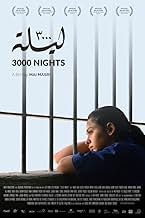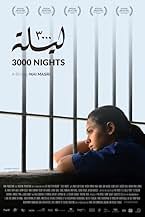3000 Layla
- 2015
- 1 घं 43 मि
IMDb रेटिंग
7.1/10
1.3 हज़ार
आपकी रेटिंग
अपनी भाषा में प्लॉट जोड़ेंA young Palestinian schoolteacher gives birth to her son in an Israeli prison where she fights to protect him, survive and maintain hope.A young Palestinian schoolteacher gives birth to her son in an Israeli prison where she fights to protect him, survive and maintain hope.A young Palestinian schoolteacher gives birth to her son in an Israeli prison where she fights to protect him, survive and maintain hope.
- पुरस्कार
- 7 जीत और कुल 5 नामांकन
Laura Samara
- Rachel
- (as Laura Hawa)
कहानी
क्या आपको पता है
- ट्रिवियाOfficial submission of Jordan for the 'Best Foreign Language Film' category of the 89th Academy Awards in 2017.
फीचर्ड रिव्यू
The Palestinian film 3000 Layla was shown in the U.S. with the translated title, 3000 Nights (2015). It was written and directed by Mai Masri.
The movie stars the wonderful actor Maisa Abd Elhadi as Layal, a young Palestinian teacher who is arrested, "tried," and convicted of a crime she didn't commit. In fact, there's not any real evidence that any crime was committed at all. (Layal is tried by an Israeli military court, where the conviction rate is 99%, so it's not really a trial.)
She is sent to prison for eight years (3000 nights). When she learns that she is pregnant, no mercy is shown to her. In fact, all four of her limbs are chained when it's time to deliver the child. The child, Nour, is a source of comfort to Layal and her cellmates, but there's very little comfort to be found elsewhere in the prison. The prison guards are brutal, as are the Israeli inmates of the jail. The Palestinians in the jail are political prisoners, but the Israeli prisoners are true criminals. Sadly, instead of making common cause with the Palestinian prisoners, the Israeli prisoners join the guards in harassing them.
This movie has the sense of a documentary about it, but it's not the story of any one woman. It's a composite of the many horrors endured by Palestinian political prisoners in Israeli jails. The movie was filmed in a abandoned prison in Jordan, so it's a real prison, not a studio set.
The acting in this film is extraordinary. The actors' portrayal of strong, determined women who have very few options is exceptional. Maisa Abd Elhadi is a great actor, and I would love to see more of her films. (She has appeared in over a dozen feature films and TV series.)
We saw this film at the excellent Little Theatre in Rochester, New York. It was shown as part of Rochester's Fifth Annual Witness Palestine Film Festival. The organizers arranged to bring Hana Chamoun to Rochester to discuss the movie. Hana Chamoun has a supporting role as Fidaa, a Palestinian prisoner whose sister is in jail with her. She told us that the filming in a real jail was harrowing, because the atmosphere of captivity surrounded them. She herself became so emotional about one scene in the movie that she was psychologically shaken by a sense that the reality of her life was blurring with the reality of the film.
This movie will work well on a small screen. However, it hasn't been officially released in the U.S., and there's no DVD available. I hate to review a movie and call it a must-see film if you can't see it! However, if it's eventually released in the U.S., be sure to find it and watch it. You'll be saddened, but not disappointed.
The movie stars the wonderful actor Maisa Abd Elhadi as Layal, a young Palestinian teacher who is arrested, "tried," and convicted of a crime she didn't commit. In fact, there's not any real evidence that any crime was committed at all. (Layal is tried by an Israeli military court, where the conviction rate is 99%, so it's not really a trial.)
She is sent to prison for eight years (3000 nights). When she learns that she is pregnant, no mercy is shown to her. In fact, all four of her limbs are chained when it's time to deliver the child. The child, Nour, is a source of comfort to Layal and her cellmates, but there's very little comfort to be found elsewhere in the prison. The prison guards are brutal, as are the Israeli inmates of the jail. The Palestinians in the jail are political prisoners, but the Israeli prisoners are true criminals. Sadly, instead of making common cause with the Palestinian prisoners, the Israeli prisoners join the guards in harassing them.
This movie has the sense of a documentary about it, but it's not the story of any one woman. It's a composite of the many horrors endured by Palestinian political prisoners in Israeli jails. The movie was filmed in a abandoned prison in Jordan, so it's a real prison, not a studio set.
The acting in this film is extraordinary. The actors' portrayal of strong, determined women who have very few options is exceptional. Maisa Abd Elhadi is a great actor, and I would love to see more of her films. (She has appeared in over a dozen feature films and TV series.)
We saw this film at the excellent Little Theatre in Rochester, New York. It was shown as part of Rochester's Fifth Annual Witness Palestine Film Festival. The organizers arranged to bring Hana Chamoun to Rochester to discuss the movie. Hana Chamoun has a supporting role as Fidaa, a Palestinian prisoner whose sister is in jail with her. She told us that the filming in a real jail was harrowing, because the atmosphere of captivity surrounded them. She herself became so emotional about one scene in the movie that she was psychologically shaken by a sense that the reality of her life was blurring with the reality of the film.
This movie will work well on a small screen. However, it hasn't been officially released in the U.S., and there's no DVD available. I hate to review a movie and call it a must-see film if you can't see it! However, if it's eventually released in the U.S., be sure to find it and watch it. You'll be saddened, but not disappointed.
टॉप पसंद
रेटिंग देने के लिए साइन-इन करें और वैयक्तिकृत सुझावों के लिए वॉचलिस्ट करें
- How long is 3000 Nights?Alexa द्वारा संचालित
विवरण
- चलने की अवधि1 घंटा 43 मिनट
- रंग
- ध्वनि मिश्रण
- पक्ष अनुपात
- 1.85 : 1
इस पेज में योगदान दें
किसी बदलाव का सुझाव दें या अनुपलब्ध कॉन्टेंट जोड़ें





























